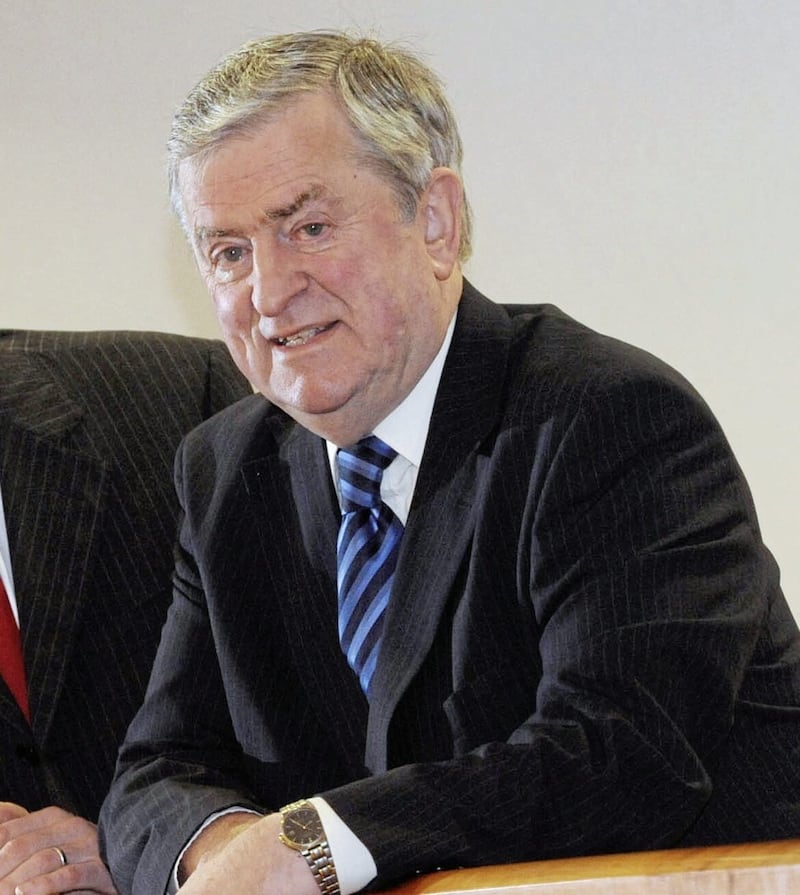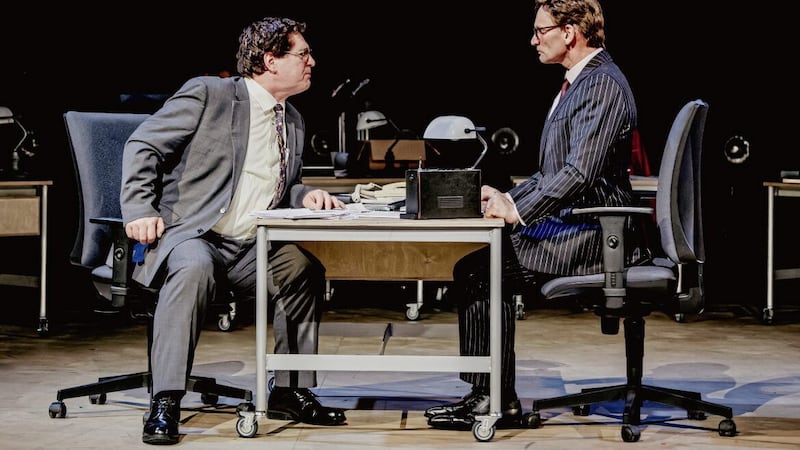Phenomenal. On every level Agreement at the Lyric Theatre is something special. Twenty-five years ago many of us were waiting to hear the outcome of the talks in Castle Building at Stormont.
As it played out we got to know the characters, from visiting superstars Senator George Mitchell and Prime Minister Tony Blair to our own cast of politicians from Gerry Adams to David Trimble and all between.
Now Owen McCafferty has taken this time of drama and put it on stage for all to witness the ebb and flow in a room at Stormont and the eventual Good Friday Agreement published on Friday April 10 1998.
For one hour and 45 minutes, with no interval, the audience is held in silence as we, perhaps for the first time, come to understand the depth of rancour between the different parties.
To see Mo Mowlam (Andrea Irvine) snatch off her wig and walk round in her stocking soles, Dan Gordon as John Hume a frustrated peace maker, Gerry Adams (Packy Lee) insisting on prisoner release, David Trimble (Patrick O'Kane) caught between and Bertie Ahern (Ronan Leahy), who left his mother's funeral to travel to Belfast to take part in the talks.
I was working in Castle Buildings at that time and when I saw Richard Croxford as the firm yet sensitive master of ceremonies, it brought back such memories of George Mitchell walking the corridors, no doubt sorting out his thinking.
This is a masterful play, from the script, direction and acting to the set, sound and props – desks and chairs in choreographed movements within the playing circle – and everyone involved was, certainly to me, perfect.
David Trimble's son Nicholas agreed, sharing his thoughts of watching the play on Facebook: "It was not without some trepidation that we went to the Lyric this afternoon to see Agreement.
"However I have to say it was a superb show. Every single cast member was brilliant and portrayed everyone down to a fine detail and the script itself was gripping, humorous and most importantly, fair to all involved. Not going to lie, it was an odd experience seeing someone play your dad on stage, but I'm glad we went."
My deep admiration goes to Owen McCafferty. What a writer, what research; touches of humour relieved the tension, only for it to build again to the climax.
He opens the play with Mitchell telling us: "Nothing is agreed until everything is agreed." Twenty-five years on, has the Good Friday Agreement delivered all it promised?
Agreement runs until April 22.

UNDOUBTEDLY WORDS MATTER
The row rages when it comes to re-writing parts of well known books and novels. It all began with Roald Dahl, where his language has been changed and challenged. How could they
Thankfully sense has prevailed and there are now two copies of The BFG, the original and the revised – much like the Bible. Thankfully, because there is such a story behind the vocabulary he uses for his characters, which is based on the result of his wife's stroke.
Film star Patricia Neal was partially paralysed and unable to speak, however she survived and gradually her speech returned although she invented words whilst grappling with the correct pronunciation.
She talked about having an "oblogon", by which she meant a cigarette; she complained that her husband made her "switch", or cross; and had the "sinkers", or depression.
He took her words and created a language all of its own, a language the interferers now want to gut and rearrange. The words are wonderful. Imagine a little girl like Sophie meeting the Big Friendly Giant, who says to her: "Just because I is a giant, you think I is a man gobbling cannybull...! Please understand that I cannot be helping it if I sometimes is saying things a little squiggly... Words is oh such a twitch tickling problem to me all my life..."
A zoo was full of "hippodumplins" and "crocadowndillies" and best of all is the "telly telly bunkum box". All part of a gobble funk language inspired by Patricia Neal who recovered and went on to have another child and an Oscar nomination.
Then we come to 'new speak' – how can a mother be anything else but a mother. Gender inclusive language means a mother is a 'birthing person' and a dad the 'non-birthing parent'.
A poor new mother will offer her baby 'chest milk' through 'chest feeding'. And so it goes on and on. I had a mother who breast fed me. My dad was my dad and they were superb parents. Let's not waste time on this subject, it's not compulsory.

CHILDHOOD MEMORIES
When I was little and attending church with my parents and brothers, I was fascinated with the stained glass windows and the congregation, both colourful and intriguing.
In front was Jack Sayers, editor of the Belfast Telegraph at the time, to one side a family of boys who years later became eminent medical men, on the other side of the aisle the Montgomery family from the Shankill Road, delightful small children I taught in morning Sunday School.
There were prominent captains of industry, portly and self-important who liked to shake hands with everyone except insignificant little girls like me. But there was one exception.
Over to my right was Vivian Simpson, a Labour MP and at one time the only non-unionist MP attending Parliament. A slight man as I remember, modest with a lovely smile and not adverse to giving a wave to an admiring child. In his family pew was son John who was destined to become the man to go to if you wanted to understand business and economics in Northern Ireland and further afield.
John, who died last Monday, was a very decisive man with a dry sense of humour, always ready to help; no matter what fact you wanted to check he was there with the answer. He was a highly regarded and knowledgeable economist and commentator on television and radio as well as input to umpteen papers and periodicals. I respected the father and the son; both made their mark on society.









